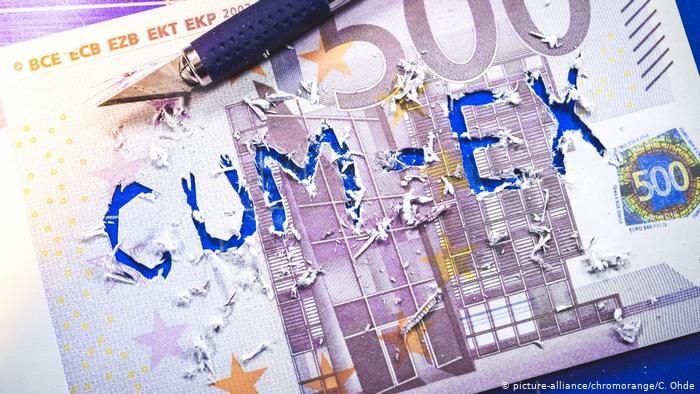A criminal trial, that has been described as the worst tax scandal in German history, began on Wednesday (4 September 2019) in the western city of Bonn, Germany. The trial involves two British investment bankers, Martin Shields, 41 who studied engineering at Oxford University, and Nicholas Diable, 38, an Accountant, in a double role — as defendants as well as the main witnesses in the case. The case centres around cum-ex trading schemes that the two and many others were involved in between 2006 and 2011.
The two Britons are alleged to have inflicted damage on the German tax department to the tune of €440m in lost tax and could face up to 10 years in jail. The fraud has been described by reporters as cum-ex trade.
When a company declares a dividend, its shares are cum-dividend. After the payment of the dividend the shares become ex-dividend. Value of cum-dividend shares will be higher than ex-dividend shares. When the company pays dividend, it deducts income tax on the shares at source and pays the dividend net of tax. The person owning the cum-dividend shares is entitled to claim relief in the amount of tax deducted at source and set off against his own tax obligations. Strangely, the German tax code allowed the holder of the cum-dividend share as well as another person who purchased the cum-dividend shares to claim tax relief.
The perpetrators in this case facilitated rapid transfer of cum-dividend shares to several parties and enabled them to make multiple claims of tax relief. This is called cum-ex trade.
According to German Finance ministry 499 fraudulent trades were made resulting in Euros 5.5 billion loss of which about Euros 2.4 billion have already been recovered. Many financial institutions including Deutsche Bank, Barclays and Sweden’s SEB, are suspected to have practised cum-ex deals between 2001 and 2012. In 2012, the legislators closed the loopholes that made the cum-ex deals possible.
Cum-ex deals are extremely complex and involve large sums that need to be handled in a coordinated way. A typical fraudulent transaction involved three parties: the actual owner of the stock, a bank that borrowed the share from the owner and sold it short and a third party who bought the share shortly before the dividend day.
The state prosecutor, Anne Brorhilker, said Shields’ testimony had already helped speed up the trial in Bonn and other investigations. Brorhilker also named another former HVB (HypoVereinsbank) trader, the New Zealand citizen Paul Mora, a trained lawyer. Media reports in Germany have identified Mora as the alleged architect of the cum-ex business. Mora has not been charged. Mora founded Ballance Capital in 2008 to specialise in cum-ex operations. His bonus package at HVB is said to have been up to €890,000. Until 2015 Mora was registered as one of the directors of the Cinnamon Club, an Indian restaurant popular with London’s political and business elite. According to Die Zeit, the Cinnamon Club was the central venue where cum-ex deals were contrived.
The lawyers of five financial institutions that benefited from the deals were there at the court. The financial institutions are: Hamburger Privatbank M.M. Warburg, its subsidiary Warburg Invest, the American Bank BNY Mellon, a fund company of the French Société Générale and the Hamburg capital management company Hansainvest.
The two Britons are alleged to have inflicted damage on the German tax department to the tune of €440m in lost tax and could face up to 10 years in jail. The fraud has been described by reporters as cum-ex trade.
When a company declares a dividend, its shares are cum-dividend. After the payment of the dividend the shares become ex-dividend. Value of cum-dividend shares will be higher than ex-dividend shares. When the company pays dividend, it deducts income tax on the shares at source and pays the dividend net of tax. The person owning the cum-dividend shares is entitled to claim relief in the amount of tax deducted at source and set off against his own tax obligations. Strangely, the German tax code allowed the holder of the cum-dividend share as well as another person who purchased the cum-dividend shares to claim tax relief.
The perpetrators in this case facilitated rapid transfer of cum-dividend shares to several parties and enabled them to make multiple claims of tax relief. This is called cum-ex trade.
According to German Finance ministry 499 fraudulent trades were made resulting in Euros 5.5 billion loss of which about Euros 2.4 billion have already been recovered. Many financial institutions including Deutsche Bank, Barclays and Sweden’s SEB, are suspected to have practised cum-ex deals between 2001 and 2012. In 2012, the legislators closed the loopholes that made the cum-ex deals possible.
Cum-ex deals are extremely complex and involve large sums that need to be handled in a coordinated way. A typical fraudulent transaction involved three parties: the actual owner of the stock, a bank that borrowed the share from the owner and sold it short and a third party who bought the share shortly before the dividend day.
The state prosecutor, Anne Brorhilker, said Shields’ testimony had already helped speed up the trial in Bonn and other investigations. Brorhilker also named another former HVB (HypoVereinsbank) trader, the New Zealand citizen Paul Mora, a trained lawyer. Media reports in Germany have identified Mora as the alleged architect of the cum-ex business. Mora has not been charged. Mora founded Ballance Capital in 2008 to specialise in cum-ex operations. His bonus package at HVB is said to have been up to €890,000. Until 2015 Mora was registered as one of the directors of the Cinnamon Club, an Indian restaurant popular with London’s political and business elite. According to Die Zeit, the Cinnamon Club was the central venue where cum-ex deals were contrived.
The lawyers of five financial institutions that benefited from the deals were there at the court. The financial institutions are: Hamburger Privatbank M.M. Warburg, its subsidiary Warburg Invest, the American Bank BNY Mellon, a fund company of the French Société Générale and the Hamburg capital management company Hansainvest.
DW.com reported.















